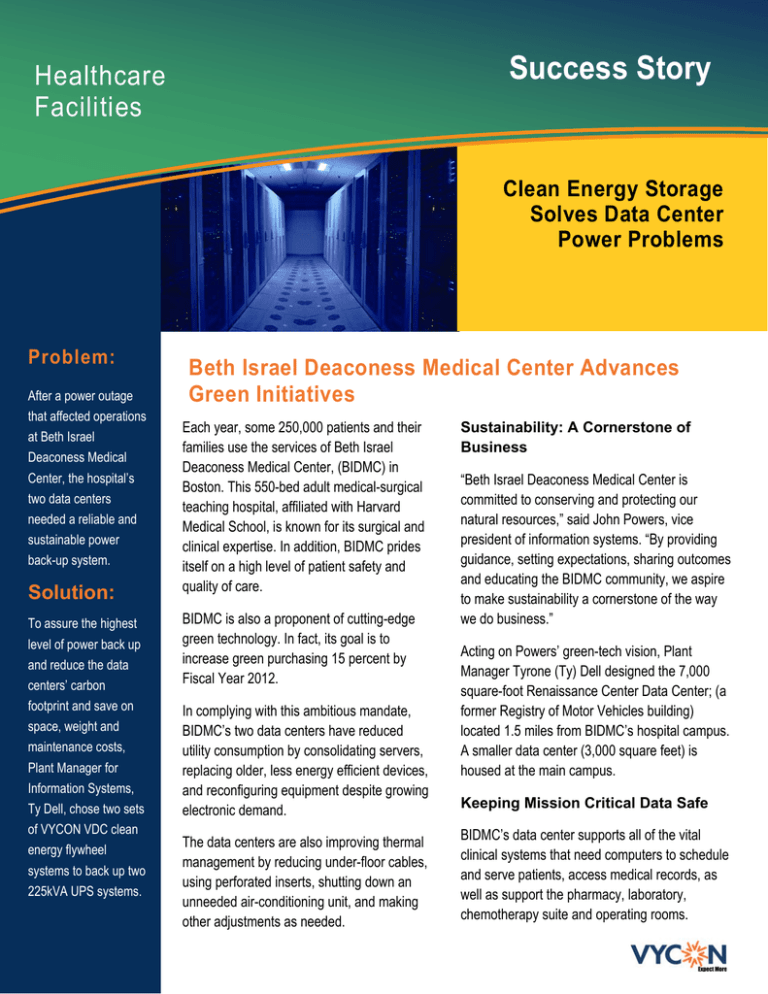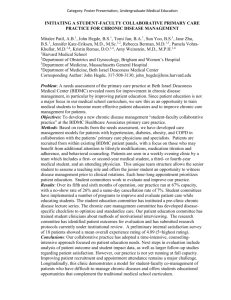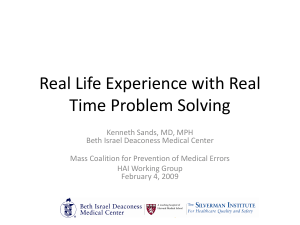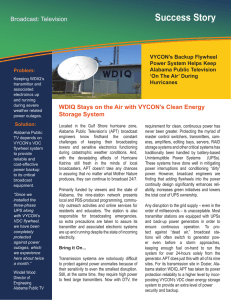Success Story Healthcare Facilities
advertisement

Success Story Healthcare Facilities Clean Energy Storage Solves Data Center Power Problems Problem: After a power outage that affected operations at Beth Israel Deaconess Medical Center, the hospital’s two data centers needed a reliable and sustainable power back-up system. Solution: To assure the highest level of power back up and reduce the data centers’ carbon footprint and save on space, weight and maintenance costs, Plant Manager for Information Systems, Ty Dell, chose two sets of VYCON VDC clean energy flywheel systems to back up two 225kVA UPS systems. Beth Israel Deaconess Medical Center Advances Green Initiatives Each year, some 250,000 patients and their families use the services of Beth Israel Deaconess Medical Center, (BIDMC) in Boston. This 550-bed adult medical-surgical teaching hospital, affiliated with Harvard Medical School, is known for its surgical and clinical expertise. In addition, BIDMC prides itself on a high level of patient safety and quality of care. BIDMC is also a proponent of cutting-edge green technology. In fact, its goal is to increase green purchasing 15 percent by Fiscal Year 2012. In complying with this ambitious mandate, BIDMC’s two data centers have reduced utility consumption by consolidating servers, replacing older, less energy efficient devices, and reconfiguring equipment despite growing electronic demand. The data centers are also improving thermal management by reducing under-floor cables, using perforated inserts, shutting down an unneeded air-conditioning unit, and making other adjustments as needed. Sustainability: A Cornerstone of Business “Beth Israel Deaconess Medical Center is committed to conserving and protecting our natural resources,” said John Powers, vice president of information systems. “By providing guidance, setting expectations, sharing outcomes and educating the BIDMC community, we aspire to make sustainability a cornerstone of the way we do business.” Acting on Powers’ green-tech vision, Plant Manager Tyrone (Ty) Dell designed the 7,000 square-foot Renaissance Center Data Center; (a former Registry of Motor Vehicles building) located 1.5 miles from BIDMC’s hospital campus. A smaller data center (3,000 square feet) is housed at the main campus. Keeping Mission Critical Data Safe BIDMC’s data center supports all of the vital clinical systems that need computers to schedule and serve patients, access medical records, as well as support the pharmacy, laboratory, chemotherapy suite and operating rooms. “If our computers went down, we couldn’t Plant Manager, Ty Dell, depends on VYCON’s VDC Flywheel systems to store energy needed at Beth Israel Deaconess Medical Center. Benefits of VYCON’s Clean Energy Storage Solution: • 20x reliability vs. VRLA batteries • High-power density, small footprint • Parallel capability that allows for future expansion • Fast recharge (under 150 seconds) • Full monitoring for predictive performance • No hazmat requirements • Low maintenance • 20-year useful life • Simple installation • N+1 redundancy options • Quiet operation • Wide temperature tolerance • High efficiency schedule someone for surgery,” Dell said. “If a power outage occurred for a prolonged period of time, we might have to detour patients to other hospitals.” So far, that hasn’t happened on Dell’s watch, but it did before he joined the hospital. “About six years ago, a UPS battery failed in one of the battery strings. While no data was lost, computers and switches had to be brought back on-line in sequence. This took several hours and business operations at the hospital were brought to a crawl while we brought systems back on-line.” BIDMC is hardly alone in this dilemma. According to the Electrical Power Research Institute (EPRI), power disturbances cost U.S. industry as much as $188 billion per year in lost data, material and productivity. In order to minimize these losses, annual spending on backup power systems exceeds $5 billion worldwide, according to industry analysts at the Darnell Group. To assure the highest level of power back up, reduce the data centers’ carbon footprint and save on space, reduce expensive cooling, weight and maintenance costs, Dell chose two sets of VYCON VDC flywheels, to back up his parallel 225kVA uninterruptible power systems (UPSs). “We found that at 400kW of computer load, we get 30 seconds of flywheel runtime while waiting for the generator to start up during a power outage,” Dell explained. This is plenty of time, as the generator must come on line within 10 seconds in order meet the NFPA 99 regulations for Emergency Power Systems. The latest flywheel designs sold by worldleaders in 3-phase UPS systems take advantage of higher speeds and full magnetic levitation packing more green energy storage into a much smaller footprint and removing any kind of bearing maintenance requirements. Success Story Return on Investment Over a 20-year design lifespan, cost savings from a hazmat-free flywheel versus a 5-minute valve regulated lead-acid (VRLA) battery bank are in the range of $100,000 to $200,000 per flywheel deployed. During a power event, the flywheel will provide backup power seamlessly and instantaneously. The nice thing is that it’s not an either or situation as the flywheel can be used with or without batteries. When used with batteries, the flywheel is the first line of defense against damaging power glitches – protecting against the frequent cycling of the batteries and prolonging their life. Since batteries are the weakest link in the power continuity scheme, flywheels with batteries reassure facility managers that their batteries are safeguarded against premature aging and unexpected failures. Going Green Dell’s dedication to green technology is appreciated greatly by his boss, John Powers. “Since Ty joined the hospital in 2005, he has introduced many improvements to our IT infrastructure to harden our mechanical and electrical facilities,” Powers explained. “We thought we were doing well, but Ty showed us how a first-class data center is equipped. “The flywheel technology is probably the project with the most pizzazz, as it is new to the scene in our medical center,” he continued. “It has worked well for us in reducing our reliance on environmentally unfriendly lead-acid batteries.” While the data centers are still using batteries, Dell looks forward to completely eliminating them altogether in order to be more energy efficient, save costs and decrease BIDMC’s carbon footprint. www.vyconenergy.com



